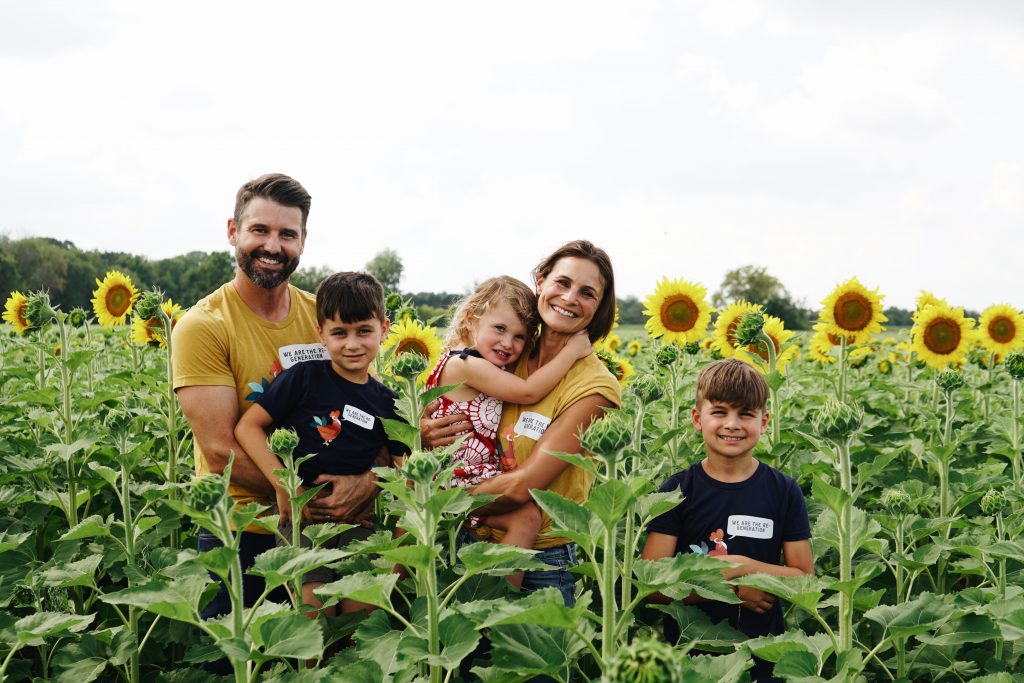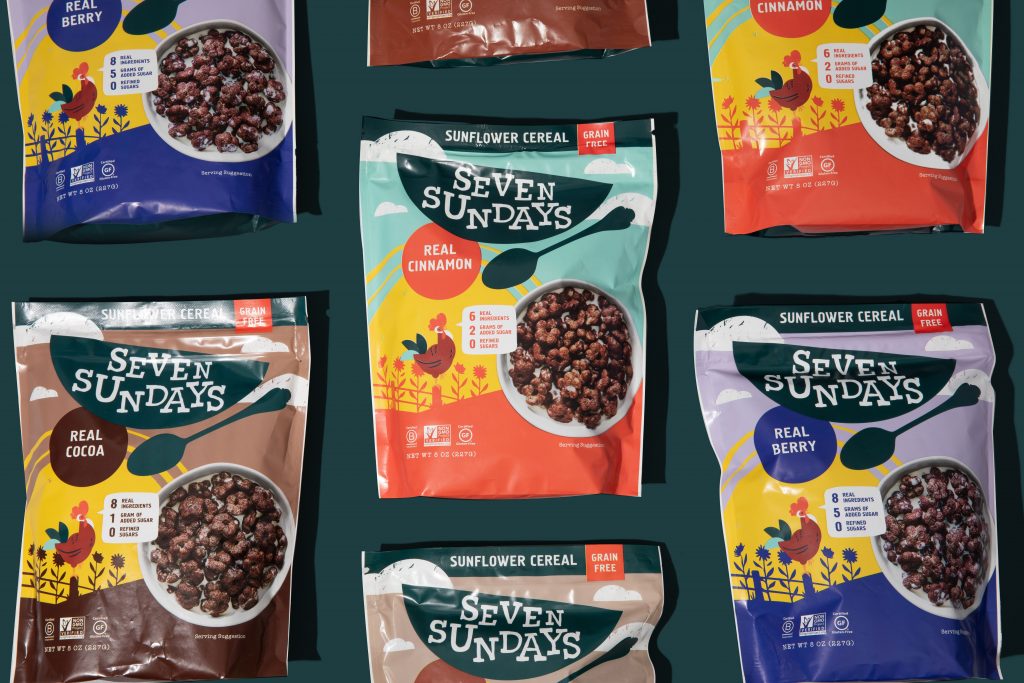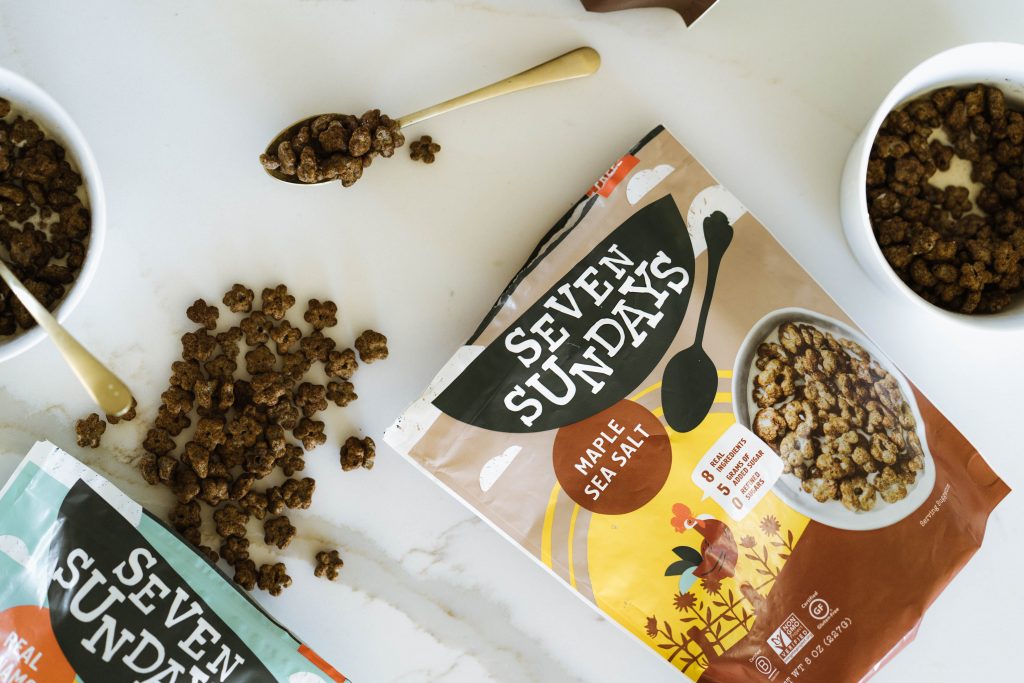For Hannah Barnstable, and her husband Brady, everything changed during their honeymoon in New Zealand. That’s where they were first introduced to, and fell in love with, muesli. When they returned home and found that US cereal aisles were stuck in a trend of sugary, overly processed options, Hannah decided to make a change.
Over a decade later, Seven Sundays now offers their core line of gluten-free mueslis, as well as keto (or grain-free) mueslis and sunflower cereals (made from sunflower proteins that would be otherwise discarded during sunflower oil production).
Hannah thinks of Seven Sundays as ingredient-led innovators dedicated to using their business to make a real, sustainable change in the cereal aisle. We sat down with Hannah to learn more about Seven Sundays and how Avisen has helped them grow from farmers markets to major retailers.

Just for starters, for those who don’t know, what is muesli and how did you discover your passion for this unique dish?
Muesli, which is an unprocessed kind of cereal — almost like an unsweetened granola with more add-ins like different grains, nuts, and spices — is kind of the heritage of our company. We’re a lot more than that now, but it’s tied into the whole mission. The reason I left my job and started Seven Sundays was because of this discovery and love of muesli-style cereal while on my honeymoon in New Zealand.
Every morning we would wake up and have these beautiful bowls of homemade muesli for breakfast. When we came back from our honeymoon, we were living in New York and I scoured every grocery store looking for this type of cereal because we wanted to keep enjoying this every morning, and a couple things happened. First, at that point, there were no mueslis of any real quality available, so that didn’t suffice. But second, I noticed that the US cereal aisle in general had really only gotten more sugary and processed while other aisles were shifting toward healthier options.
From there, how did you go about starting Seven Sundays and what were the early days of the company like?
From the start, it was really important to me that I was close to the product and the ingredients. We were moving back to Minneapolis and I left the finance world. I’m a big foodie, ingredient-focused person. I love to cook and to entertain, and so it was important that I make everything and know as much as I can about the ingredients and where they come from as possible.
So, we started by renting some kitchen space. I had a bike with a trailer. Local Minnesota farmers delivered bags of organic oats and other ingredients to my house. I would develop recipes and take them to farmers markets and handout samples. From there, we really developed a loyal following. People would track me down when the market first opened in the morning to get the new cereal varieties.
Eventually the Wedge Co-op found us at the market and asked if they could put the cereal in their stores, and that’s where the retail line started.

How has Seven Sundays changed or evolved since you first founded the company?
The good news is cereal is in every grocery store, and it’s a big aisle. Over the past 15 years, cereal’s been in a pretty steady decline. That allowed a small brand like ours to launch and speak with bigger retailers, like Costco, Whole Foods, and Target, and say “Can we help bring people back to the cereal aisle?”
Initially that was just with our muesli. Now, today, we also offer more traditional cereals, but made in a totally different way. These stores were all open to that, because they were faced with the challenge of trying to reverse the declines of that aisle.
The reason we expanded beyond muesli was really because of our original mission. What we set out to do was to “clean up” the cereal aisle. It goes back to those days in New York after our honeymoon looking for muesli and realizing that, while everyone knows breakfast is important, what we’re offering isn’t healthy and needs to change.
After getting to better know the space and the category through selling our muesli, we sat down and discussed how we could make an even bigger impact. People were loving the muesli – this thing that most of them couldn’t even pronounce — and we wondered if we could create a more traditional cereal, but made with things you can find in your kitchen rather than processed ingredients.
So, we set out to do that, with the idea of making a bigger impact in the aisle. Muesli is amazing, but it has a naturally smaller consumer base. We knew we could get more people on board with our mission with cereal. That was maybe two and a half years ago, and interestingly, with the cereal launch, the muesli has really taken off too.
What does the name Seven Sundays mean?
The idea is to treat every morning like a Sunday morning. We went into this endeavor to reinvent breakfast. Part of that is to feel good about what you’re eating every morning. It seemed like Sundays are the one day where people put in a little more effort, or are more intentional with what they eat. We wanted to make it easy to do that seven days a week.
What does it mean to be a B-Corporation and why are you proud of this classification?
As a B-Corporation, we balance our profit with our mission, as well as focus on things like sustainable packaging, local sourcing, and transparency for the consumer. It’s so much of our identity. I feel passionately that business should be used as a force for good. A lot of things can happen when companies grow and become these large, multi-million dollar, publicly-traded corporations. When we had decided to start something, we wanted to inspire doing business a different way. We wanted less of a focus on driving profit, and more of a focus on making the world better.
We’ve been doing that since day one. We’re always paving our own road. I think, to be truly innovative, you have to do things your own way.
Also, if you think of everything food touches, it’s so much. Food has a huge impact on not only the health of us as people, but also the health of plants and soil. There’s also the socio-economic side of food and groceries.
So, as we started to grow outside of just a family business and outside of Minnesota, we wanted new customers to understand what we stand for. The B-Corp certification is really the leader in that space of using business as a force for good and represents our business to these new customers right away.
We became B-Corp certified in 2019. And what’s also great about this certification is it’s not one-and-done. We are required, every three years, to show improvements. What that does is it starts to impact every decision we make as a company. When we have a packaging or a supplier decision to make, it’s not about who’s the most affordable. We’re talking about which one has the least impact, is made with more recycled materials, or is locally sourced. We’re looking at that full picture.

What changes would you like to see in the grocery aisle 5 or 10 years from now?
I’d like to see, for all of the grocery store, more transparency for the consumer. I think it’s a confusing place when you’re trying to make better decisions for your health. I think it’s urgent to have more transparency and understanding around the marketing that’s used today for things like health claims. Right now, just because a product says “keto” doesn’t mean it’s the best choice for you and your body.
We want to be leaders in educating people on what they’re eating.
The other big deal is the idea of regenerative farming, soil health, and climate change. So much of the carbon in the atmosphere is directly related to industrial farming practices. That’s a huge hurdle for us to get through to educate consumers that the choices you make in terms of what you’re eating has, perhaps, the biggest impact you can make on climate change. People don’t realize this and we’d love to see more certifications and education to address this.
How did you meet Lisa Holter Ankel from Avisen Legal?
I had met a group of women here in the Twin Cities when we were first scaling up the business – we had just landed Target distribution and we wanted to do a small round of angel investing – and these women were awesome individuals in finance and private equity here in the community. They immediately said that we should bring in Lisa to help with the company and the capital raising. She came as a very strong referral from this group, and I’m so glad they recommended her.
From there, it was game over on looking anywhere else, because she’s incredible, thoughtful, and has been there for us every step along the way since that first capital raising.
How has Lisa’s experience in business law helped Seven Sundays?
Lisa has connections or experience with everything we’ve thrown at her. There’s never been something she can’t tackle for us. It’s beyond the finance and capital side. We brought her in for lease negotiations and to help with various other contracts. She’s such a help with all sorts of things.
Really, the thing that has been the most valuable is that she looks at everything so thoroughly and through its own lens. So many of the things we bring her don’t have one-size-fits-all solutions. That’s something really unique about Lisa. She’s so creative and thorough in the way she looks at problems that you know there’s not going to be an issue with the solutions she provides.
What advice do you give to other young entrepreneurs or business owners?
Stay focused on your mission, more so even than your product or your service. Ultimately your mission drives your company. I even catch myself on this still. Lean into your mission, because your products might change.
On top of that, make sure you’re paving your own road. If you’re on a path someone else takes, you’re likely not being innovative and probably not staying true to your mission. You have all the space in the world to carve your own road.
Finally, focus on good relationships. Ultimately, contracts are so important, and having a good attorney is just as important. If you’re going into a business relationship with someone, you want to make sure it feels like the type of relationship you want to be in.
Learn more about Seven Sundays, including tasty recipes, their breakfast subscription services, and their commitment to regeneration, at https://www.sevensundays.com/.







